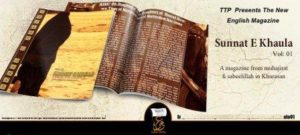There’s a new magazine out in Pakistan. It’s objective: to recruit women into a career of lifelong militancy.
A new push by one of Pakistan’s most notorious militant groups to attract female fighters looks like an effort to keep up with Islamic State (IS) and other extremists who have used such appeals to bolster their ranks with women and spread propaganda, close observers of the militants’ strategies say.
On August 1, the Tehrik-e Taliban Pakistan (TTP), also known as the Pakistani Taliban, released the first edition of a magazine tailored for women called Sunnat E Khaula, or The Way Of Khaula, a reference to a female follower of the Prophet Muhammad.
“The Pakistani Taliban is trying to draw on disaffected, educated Muslim women,” says Omar Waraich, a Pakistani journalist. “IS has targeted that demographic very effectively.”
The TTP has previously issued publications in Urdu and English to attract new recruits, but the new 45-page magazine marks the first time it has tailored its message to women.
The militant group says the latest publication is intended to “provoke women of Islam to come forward and join the ranks of [the holy warriors] of Islam.”
The TTP and IS, like other radical Islamist groups preaching violent jihad, vie for new recruits and influence in Pakistan and beyond, in some cases employing sophisticated digital and Internet strategies.
IS militants have persuaded hundreds of Muslim women and converts to join the Sunni extremist group in Syria and Iraq, where their tasks include performing domestic work and giving birth to a new generation of fighters. Women have also fought on the battlefield as the last line of defense.
IS has routinely abducted and raped women in areas where it has gained control since coming to international prominence in 2014 and declaring itself a global caliphate.
New Tool In A ‘Bag Of Tricks’
Tore Hamming, a researcher on militant Islam, says the TTP has taken notice of IS’s ability to attract both single women and married women who have joined their husbands already fighting on the battlefield.
Hamming says the TTP’s magazine for women is a continuation of the current trend among extremist groups.
Organize secret gatherings at home and invite like-minded jihadi sisters. Distribute literature reflecting on the obligation of jihad. Arrange physical training classes for sisters. Learn how to operate simple weapons. Learn the use of grenades.”
— Excerpt from Sunnat E Khaula
“Jihadi outfits have in recent years focused a lot on expanding their media and two important issues have been publications in several languages and addressing different target groups, including women,” he says
The TTP’s publication has shed light on the radicalization and recruitment of women in Pakistan, a deeply conservative and religious country that has been a hotbed of militancy.
Marvi Sirmed, a Pakistani political commentator, says the appeals to women in the South Asian country have increased in recent years, particularly in universities. She says Pakistani extremist groups initially succeeded in bringing more women into the fold through propaganda campaigns spread via Facebook groups and Telegram channels.

“Initiating a special publication is also part of the same drive, further intensifying it,” she says. “They need an active workforce consisting of women to attack soft targets. This publication may be one tool out of their large bag of tricks to lure more women to join their cause as an active force on the ground.”
Sirmed says recruiting women can be particularly effective in spreading extremist ideology because of the influence women enjoy within the family.
[with inputs from Radio Free Europe]


